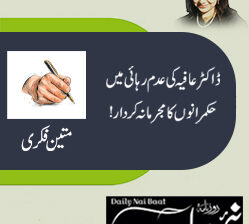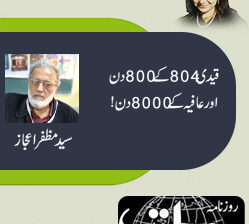MIT colleague speaks of Aafia
By Usman Saleem
(First Published by CagePrisoners)
Aafia was not one to brainwashed, and was certainly not an irate, blind extremist.
I remember Aafia as a fellow MIT student – and then an alumna – who was intellectually diligent, conscientious in her conduct, and considerate of others. A single incident stands out as especially illustrating this. She was once in a car accident in which someone rear-ended her. By law, the other party was at fault, which meant that Aafia’s expenses would be covered by the other party’s insurance policy. But Aafia knew that she had forgotten to give the indicator for changing lanes, and her conscience didn’t allow her to let the other person pay. She therefore went ahead to pay – out of her own pocket – for the damage to the other person’s car.
For as long as I knew her, Aafia’s religious faith was very important to her and this deed of kindness to a stranger showed me the deep moral grounding of that faith. It was the same acute consciousness of moral obligation that led her, during the humanitarian crisis in Bosnia, to devote herself to arranging to find sponsors for orphans. I remember finding her busy with this at small hours of the morning, on a school day. (Her later, PhD research choice shows the same love for children, and so too her plans to work as a children’s teacher.) Aafia became prominent in the local community as a spirited proponent of good causes. After the situation in Bosnia had settled down, she started her own organization, which provided translations of the Qu’ran (the solid, mainstream translations by Pickthall and Yusuf Ali) in response to requests from prisons and elsewhere. She had dreams of expanding her organization to serve larger social functions, doubtless motivated by her mother’s social work in Pakistan.
Aafia’s approach to Islam was guided by morality and service, but was also deeply intellectual. She was continually looking for ways to better herself and to lean and understand more. While at MIT she independently chose to do research on evolution, outside of her coursework. She also availed herself of different resources in the community to add to the breadth and depth of her knowledge of the beliefs and practices of Islam. Aafia was not one to brainwashed, and was certainly not an irate, blind extremist. When suicide bombings started to make the news, I remember her remarking that she couldn’t find justification for them in the Qu’ran or the hadiths. Aafia was generally sceptical of fringe religious views, for she valued and was attached to traditional understandings of Islam.
This is the Aafia that I remember, through her years in Boston: a kind, generous, energetic individual who aimed to contribute productively to improving the world.





